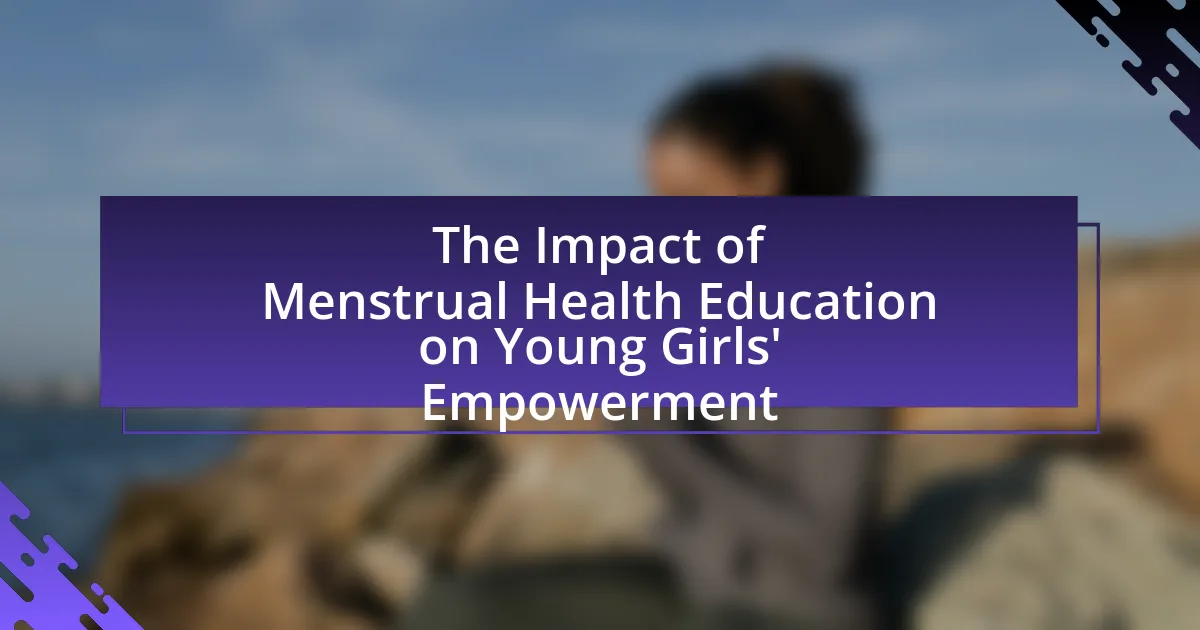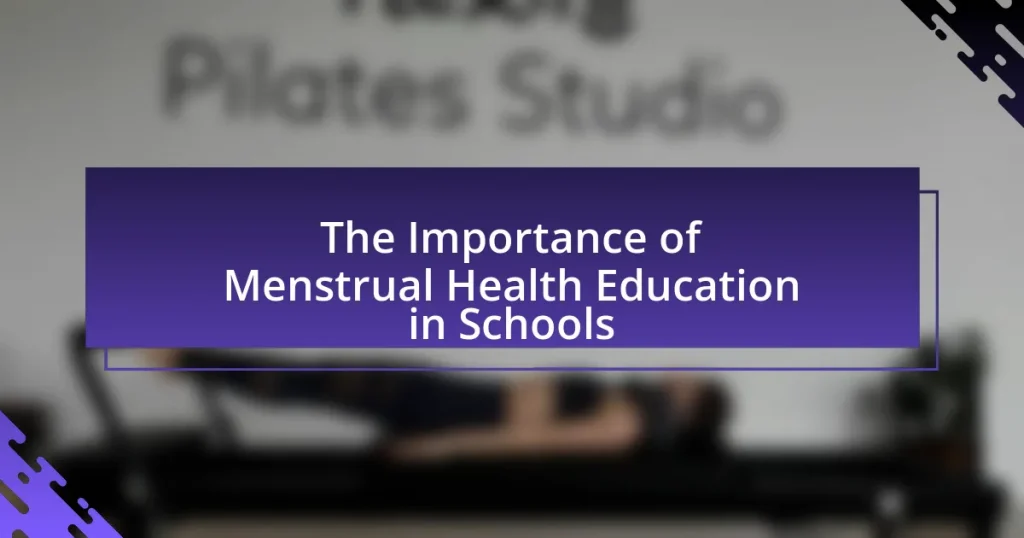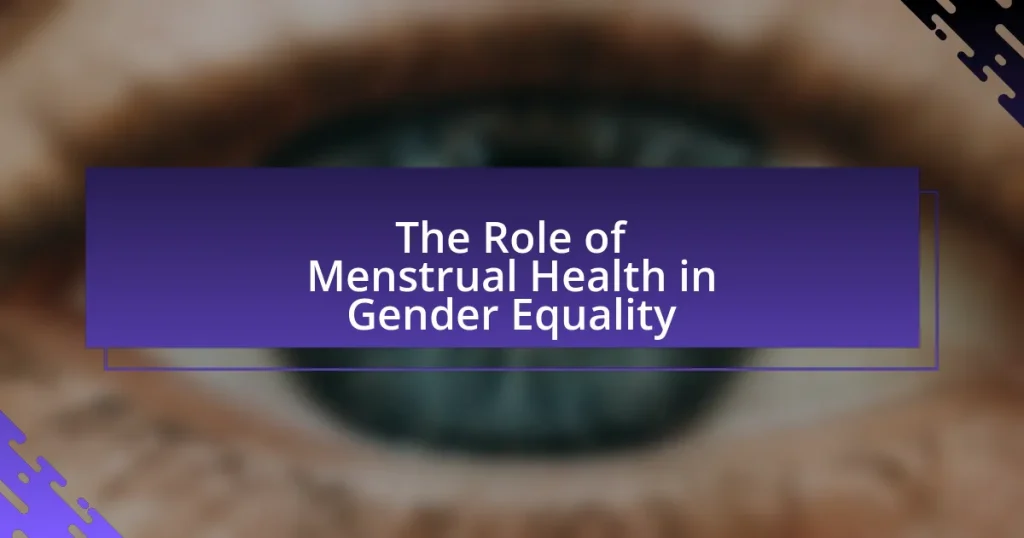The article examines the impact of menstrual health education on the empowerment of young girls, highlighting its role in enhancing knowledge about their bodies, health, and rights. It discusses how comprehensive education fosters confidence, reduces stigma, and encourages open dialogue about menstruation, leading to improved school attendance, participation in activities, and overall quality of life. Key concepts covered include biological understanding, menstrual hygiene management, emotional aspects, and societal implications, emphasizing the importance of education in promoting gender equality and challenging misconceptions surrounding menstruation. The article also outlines best practices for implementing effective menstrual health education in schools and communities, underscoring the critical role of parents and educators in supporting young girls’ empowerment.
What is the Impact of Menstrual Health Education on Young Girls’ Empowerment?
Menstrual health education significantly enhances young girls’ empowerment by providing them with essential knowledge about their bodies, health, and rights. This education fosters confidence, reduces stigma, and encourages open discussions about menstruation, which are crucial for personal and social development. Studies indicate that girls who receive comprehensive menstrual health education are more likely to attend school regularly, participate in sports, and engage in community activities, thereby improving their overall quality of life and future opportunities. For instance, a study published in the journal “BMC Women’s Health” found that girls with access to menstrual health education reported higher self-esteem and better academic performance compared to those without such education.
How does menstrual health education influence young girls’ understanding of their bodies?
Menstrual health education significantly enhances young girls’ understanding of their bodies by providing them with accurate information about menstruation and reproductive health. This education helps demystify the physiological changes they experience, fostering a sense of normalcy and acceptance regarding their menstrual cycles. Research indicates that girls who receive comprehensive menstrual health education are more likely to report increased confidence in managing their menstrual health and a better understanding of their bodies’ functions. For instance, a study published in the Journal of Adolescent Health found that girls who participated in menstrual health education programs demonstrated improved knowledge about menstrual hygiene and reproductive health, leading to healthier practices and reduced stigma surrounding menstruation.
What key concepts are included in menstrual health education?
Key concepts included in menstrual health education are biological understanding, menstrual hygiene management, emotional and psychological aspects, and social and cultural implications. Biological understanding covers the menstrual cycle, anatomy, and reproductive health, providing foundational knowledge about menstruation. Menstrual hygiene management emphasizes the importance of using sanitary products, maintaining cleanliness, and understanding the health risks associated with poor hygiene. Emotional and psychological aspects address the feelings and attitudes surrounding menstruation, including stigma and mental health. Social and cultural implications explore how different cultures perceive menstruation and the impact of these beliefs on girls’ empowerment and access to education.
How does knowledge of menstrual health contribute to self-esteem in young girls?
Knowledge of menstrual health significantly contributes to self-esteem in young girls by empowering them with information that fosters confidence and reduces stigma. When girls understand the biological processes of menstruation, they are more likely to view their bodies positively and feel in control of their health. Research indicates that comprehensive menstrual health education leads to improved self-image and reduced anxiety related to menstruation, as girls are equipped to manage their periods effectively and discuss them openly. For instance, a study published in the Journal of Adolescent Health found that girls who received menstrual health education reported higher self-esteem levels and a greater sense of agency regarding their bodies. This knowledge not only normalizes menstruation but also encourages young girls to embrace their femininity, thereby enhancing their overall self-worth.
Why is menstrual health education important for young girls?
Menstrual health education is crucial for young girls as it empowers them with knowledge about their bodies and reproductive health. This education helps to demystify menstruation, reducing stigma and misconceptions that can lead to shame or embarrassment. Studies show that girls who receive comprehensive menstrual health education are more likely to manage their menstrual hygiene effectively, which is essential for their health and well-being. Furthermore, informed girls are better equipped to advocate for their needs and rights, contributing to their overall empowerment and confidence in navigating societal challenges related to gender and health.
What are the societal implications of educating young girls about menstrual health?
Educating young girls about menstrual health has significant societal implications, including improved gender equality and enhanced educational outcomes. When girls receive accurate information about menstrual health, they are more likely to attend school consistently, reducing absenteeism linked to menstruation. For instance, a study by the Global South Coalition for Education found that menstrual health education can decrease school dropout rates among girls by up to 20%. Furthermore, this education fosters a culture of openness and reduces stigma surrounding menstruation, empowering girls to advocate for their health and well-being. As a result, communities benefit from a more educated female population, which can lead to economic growth and improved health outcomes for future generations.
How does menstrual health education affect academic performance in young girls?
Menstrual health education positively affects academic performance in young girls by reducing absenteeism and enhancing confidence. Studies indicate that when girls receive comprehensive menstrual health education, they are more likely to attend school during their menstrual periods, as they feel informed and prepared to manage their symptoms. For instance, research published in the Journal of Adolescent Health found that girls who participated in menstrual health education programs experienced a 20% decrease in school absenteeism related to menstruation. Additionally, this education fosters a supportive environment, allowing girls to engage more actively in their studies, which correlates with improved academic outcomes.
What challenges do young girls face without menstrual health education?
Young girls face significant challenges without menstrual health education, including misinformation about menstruation, increased stigma, and negative impacts on health and academic performance. Misinformation can lead to fear and anxiety surrounding menstruation, as girls may not understand the biological processes involved. The stigma associated with menstruation can result in social isolation and embarrassment, further exacerbating mental health issues. Additionally, a lack of knowledge can lead to poor menstrual hygiene practices, increasing the risk of infections and other health complications. Research indicates that girls who lack menstrual health education are more likely to miss school during their periods, which can hinder their academic progress and limit future opportunities.
How does lack of education impact young girls’ health and well-being?
Lack of education significantly impacts young girls’ health and well-being by limiting their access to essential health information and resources. Without education, girls are less likely to understand menstrual health, leading to increased stigma, misinformation, and inadequate hygiene practices during menstruation. Research indicates that girls who lack education are more prone to health issues such as reproductive infections and mental health challenges due to the stress of managing menstruation without proper knowledge. For instance, a study published in the journal “BMC Women’s Health” found that girls with limited education reported higher rates of absenteeism from school during their menstrual periods, which further exacerbates their educational disadvantage and overall well-being.
What misconceptions about menstruation persist in society?
Misconceptions about menstruation that persist in society include the belief that menstruation is dirty or shameful, that it impairs a woman’s ability to participate in daily activities, and that menstrual cycles are always regular. These misconceptions can lead to stigma and misinformation, affecting women’s health and well-being. For instance, the idea that menstruation is unclean is rooted in cultural taboos, which can discourage open discussions about menstrual health. Additionally, research indicates that many women experience irregular cycles due to various factors, including stress and health conditions, contradicting the notion that all women have predictable cycles. Addressing these misconceptions through education can empower young girls and promote a healthier understanding of menstruation.
How can menstrual health education be effectively implemented?
Menstrual health education can be effectively implemented through comprehensive school-based programs that integrate accurate information about menstruation, hygiene, and reproductive health. Research indicates that such programs, when delivered in a supportive environment, significantly improve knowledge and attitudes towards menstruation among young girls. For instance, a study published in the Journal of Adolescent Health found that girls who participated in school-based menstrual health education reported increased confidence and reduced stigma related to menstruation. Additionally, involving parents and communities in educational initiatives enhances understanding and support, further empowering young girls.
What role do parents and educators play in menstrual health education?
Parents and educators play a crucial role in menstrual health education by providing accurate information and fostering open communication about menstruation. This involvement helps demystify the topic, reduces stigma, and empowers young girls to understand their bodies. Research indicates that when parents engage in discussions about menstruation, it positively influences girls’ attitudes towards their menstrual health, leading to better self-esteem and confidence. Additionally, educators who incorporate comprehensive menstrual health education into the curriculum contribute to a supportive learning environment, equipping students with essential knowledge and skills. Studies show that schools with effective menstrual health programs report higher attendance rates among girls during their menstrual periods, highlighting the importance of this education in promoting overall well-being and empowerment.
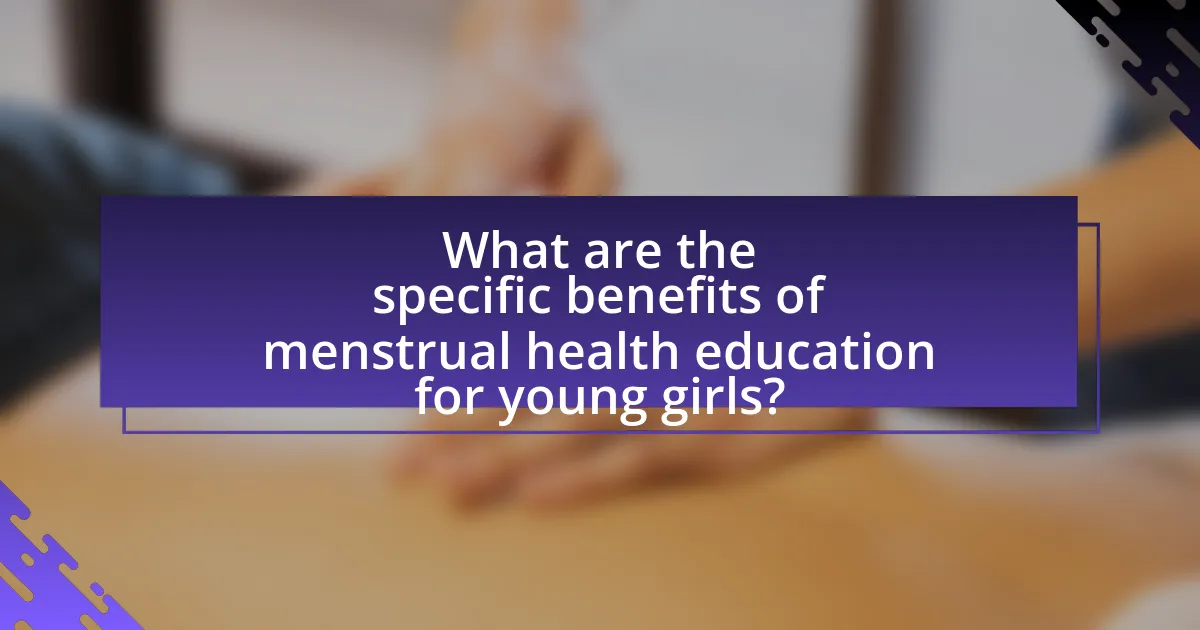
What are the specific benefits of menstrual health education for young girls?
Menstrual health education provides young girls with essential knowledge about their bodies, leading to improved self-esteem and empowerment. By understanding the biological processes of menstruation, girls can better manage their menstrual health, reducing anxiety and stigma associated with periods. Research indicates that comprehensive menstrual health education can lead to increased school attendance during menstruation, as girls feel more prepared and confident to participate in educational activities. Furthermore, studies show that girls who receive menstrual health education are more likely to engage in discussions about reproductive health, fostering a supportive environment that encourages open communication and reduces misinformation.
How does menstrual health education empower young girls in their communities?
Menstrual health education empowers young girls in their communities by providing them with essential knowledge about their bodies, reproductive health, and hygiene management. This education fosters confidence and self-esteem, enabling girls to participate more actively in school and community activities. Research indicates that when girls receive comprehensive menstrual health education, they are less likely to miss school during their periods; for instance, a study by the Global Education Monitoring Report found that girls with access to menstrual health education and resources are 20% more likely to stay in school. Additionally, this education helps to break the stigma surrounding menstruation, promoting open discussions and support networks among peers and families, which further enhances community cohesion and understanding.
What leadership opportunities arise from menstrual health education?
Leadership opportunities arising from menstrual health education include the ability to advocate for policy changes, lead community awareness campaigns, and mentor peers in understanding menstrual health. By educating others, individuals can influence public perceptions and reduce stigma associated with menstruation, fostering an environment of support and understanding. For instance, programs like the Menstrual Health Management initiative by UNICEF have demonstrated that when young girls are empowered with knowledge, they can take on leadership roles in their communities, promoting health education and advocating for better resources. This empowerment not only enhances their leadership skills but also contributes to broader societal changes regarding women’s health and rights.
How can young girls advocate for their health and rights through education?
Young girls can advocate for their health and rights through education by actively participating in menstrual health education programs that empower them with knowledge about their bodies and rights. These educational initiatives provide critical information on menstrual hygiene management, reproductive health, and the importance of seeking medical help when needed. Research shows that girls who receive comprehensive menstrual health education are more likely to attend school regularly, as they feel more confident and informed about managing their menstrual cycles. For instance, a study published in the journal “BMC Public Health” found that girls who participated in menstrual health education reported a 30% increase in school attendance during their menstrual periods. This empowerment through education enables young girls to challenge stigmas, advocate for necessary resources, and engage in discussions about their health rights within their communities.
What skills do young girls develop through menstrual health education?
Young girls develop critical skills such as self-awareness, health literacy, and communication through menstrual health education. Self-awareness is fostered as girls learn to understand their bodies and menstrual cycles, which enhances their confidence and ability to manage their health. Health literacy is improved as they gain knowledge about menstrual hygiene, reproductive health, and the biological processes involved, enabling informed decision-making. Additionally, communication skills are cultivated as girls engage in discussions about menstruation, breaking taboos and fostering open dialogue with peers and family. Research indicates that comprehensive menstrual health education leads to increased confidence and empowerment among young girls, contributing positively to their overall well-being and social interactions.
How does critical thinking play a role in understanding menstrual health?
Critical thinking is essential in understanding menstrual health as it enables individuals to analyze, evaluate, and synthesize information related to menstruation. By applying critical thinking, individuals can discern between myths and facts, leading to informed decisions about menstrual hygiene, health practices, and overall well-being. Research indicates that comprehensive menstrual health education, which fosters critical thinking, significantly improves knowledge and attitudes towards menstruation among young girls, empowering them to manage their health effectively and challenge societal stigmas. For instance, a study published in the Journal of Adolescent Health found that girls who received critical thinking-based menstrual health education reported higher confidence in discussing menstrual issues and seeking help when needed.
What communication skills are enhanced through discussions about menstrual health?
Discussions about menstrual health enhance several communication skills, including active listening, empathy, and assertiveness. Active listening is developed as participants engage in conversations, ensuring they understand diverse perspectives on menstrual health. Empathy is fostered through sharing personal experiences, allowing individuals to connect emotionally and support one another. Assertiveness is strengthened as individuals learn to express their needs and concerns regarding menstrual health openly. Research indicates that effective communication in health education settings leads to improved understanding and advocacy, which is crucial for empowerment in young girls.
How does menstrual health education contribute to gender equality?
Menstrual health education contributes to gender equality by empowering girls with knowledge about their bodies, which fosters confidence and reduces stigma. This education enables young girls to manage their menstrual health effectively, leading to increased school attendance and participation in activities, as evidenced by a study from the Global South that found that comprehensive menstrual health education can reduce absenteeism by up to 20%. Furthermore, when girls understand their menstrual health, they are more likely to advocate for their rights and challenge societal norms, thus promoting gender equality in their communities.
What connections exist between menstrual health education and women’s rights?
Menstrual health education is intrinsically linked to women’s rights as it empowers women to understand and manage their reproductive health, which is a fundamental aspect of gender equality. Access to accurate menstrual health information enables women to make informed choices about their bodies, thereby promoting autonomy and challenging societal taboos surrounding menstruation. Studies have shown that comprehensive menstrual health education can lead to increased school attendance among girls, as it reduces stigma and misinformation, ultimately contributing to women’s rights to education and health. For instance, research published by the United Nations Population Fund highlights that when girls receive education about menstrual health, they are more likely to stay in school, which is crucial for their empowerment and future opportunities.
How can menstrual health education challenge gender stereotypes?
Menstrual health education can challenge gender stereotypes by promoting open discussions about menstruation, thereby normalizing the topic and reducing stigma. This education empowers young girls to understand their bodies, fostering confidence and dismantling the notion that menstruation is a taboo subject. Research indicates that comprehensive menstrual health education leads to improved self-esteem and body positivity among girls, which directly counters traditional gender norms that often portray menstruation as a weakness or something to be hidden. For instance, a study published in the Journal of Adolescent Health found that girls who received menstrual health education reported feeling more comfortable discussing their menstrual health, which is crucial for challenging societal misconceptions and stereotypes surrounding gender and menstruation.
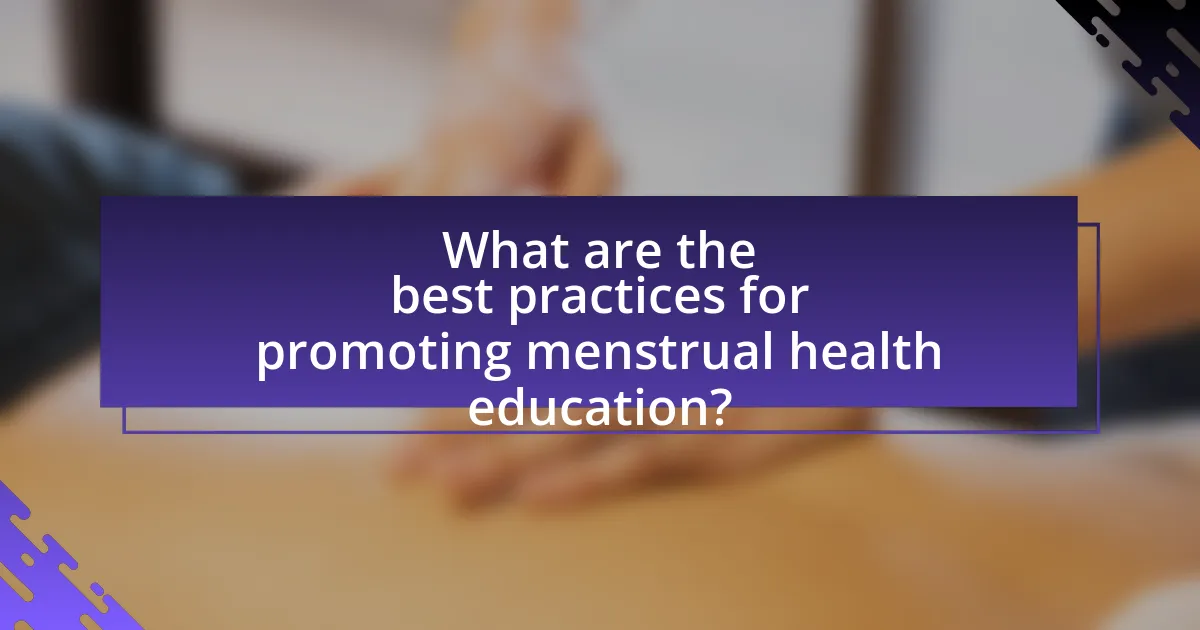
What are the best practices for promoting menstrual health education?
The best practices for promoting menstrual health education include integrating comprehensive curriculum in schools, engaging parents and communities, and utilizing digital platforms for outreach. Schools should implement age-appropriate, evidence-based programs that cover biological, emotional, and social aspects of menstruation, as studies show that informed students are more likely to manage their menstrual health effectively. Engaging parents and communities fosters a supportive environment, as research indicates that open discussions reduce stigma and enhance understanding. Additionally, leveraging digital platforms, such as social media and educational websites, can reach a broader audience, particularly in areas with limited access to traditional education, thereby increasing awareness and knowledge about menstrual health.
How can schools integrate menstrual health education into their curricula?
Schools can integrate menstrual health education into their curricula by incorporating comprehensive lessons on menstruation, reproductive health, and hygiene management into existing health or science classes. This approach ensures that students receive accurate information in a structured manner, fostering a supportive environment for discussions about menstrual health. Research indicates that comprehensive menstrual health education can significantly reduce stigma and improve knowledge among students, as evidenced by a study published in the Journal of Adolescent Health, which found that such programs led to increased awareness and positive attitudes towards menstruation among young girls.
What resources are available for educators teaching menstrual health?
Educators teaching menstrual health can access a variety of resources, including comprehensive curricula, online training modules, and community workshops. Organizations such as the World Health Organization provide guidelines and educational materials specifically designed for teaching menstrual health, emphasizing the importance of accurate information and cultural sensitivity. Additionally, platforms like Menstrual Health Hub offer a wealth of resources, including lesson plans and research articles, to support educators in delivering effective menstrual health education. These resources are crucial for empowering young girls by providing them with the knowledge and skills needed to manage their menstrual health confidently.
How can community programs support menstrual health education initiatives?
Community programs can support menstrual health education initiatives by providing accessible resources, facilitating workshops, and fostering open discussions about menstruation. These programs can create safe spaces where young girls can learn about menstrual health without stigma, which is crucial for their empowerment. For instance, research indicates that comprehensive menstrual health education can significantly improve knowledge and attitudes towards menstruation, leading to better health outcomes and increased confidence among girls. By partnering with schools and health organizations, community programs can ensure that accurate information is disseminated, addressing misconceptions and promoting positive menstrual health practices.
What strategies can parents use to discuss menstrual health with their daughters?
Parents can use open communication, education, and supportive resources to discuss menstrual health with their daughters. Open communication involves creating a safe space where daughters feel comfortable asking questions and expressing their feelings about menstruation. Education can include providing accurate information about the menstrual cycle, hygiene practices, and the physical and emotional changes that occur during this time. Supportive resources may consist of books, workshops, or online materials that offer comprehensive insights into menstrual health. Research indicates that when parents engage in these strategies, it fosters a positive attitude towards menstruation and empowers young girls to manage their health confidently.
How can open communication foster a positive attitude towards menstruation?
Open communication can foster a positive attitude towards menstruation by normalizing discussions about it and reducing stigma. When individuals, especially young girls, engage in open dialogues about menstruation, they gain accurate information, which dispels myths and misconceptions. Research indicates that comprehensive menstrual health education, which includes open communication, leads to increased confidence and comfort among girls regarding their menstrual experiences. For instance, a study published in the Journal of Adolescent Health found that girls who participated in open discussions about menstruation reported feeling more empowered and less anxious about their periods. This empowerment is crucial for promoting a healthy attitude towards menstruation, ultimately contributing to better menstrual health management and overall well-being.
What age-appropriate resources can parents utilize for discussions?
Parents can utilize age-appropriate resources such as books, educational websites, and interactive apps to facilitate discussions about menstrual health. For instance, books like “The Care and Keeping of You” by Valorie Schaefer provide relatable information for pre-teens, while websites like KidsHealth offer articles tailored to different age groups. Additionally, apps like Clue and Flo can help older girls track their menstrual cycles and understand their bodies better. These resources are designed to be accessible and informative, promoting healthy conversations about menstrual health and empowering young girls with knowledge.
What are the key takeaways for ensuring effective menstrual health education?
Key takeaways for ensuring effective menstrual health education include providing accurate, age-appropriate information, fostering an open and supportive environment, and integrating cultural sensitivity into the curriculum. Accurate information helps dispel myths and misconceptions, while age-appropriate content ensures that the material is relatable and understandable for the audience. A supportive environment encourages girls to ask questions and share experiences, which enhances learning. Cultural sensitivity acknowledges diverse beliefs and practices surrounding menstruation, making education more relevant and respectful. Research indicates that comprehensive menstrual health education can significantly improve girls’ confidence and self-esteem, leading to greater empowerment.
